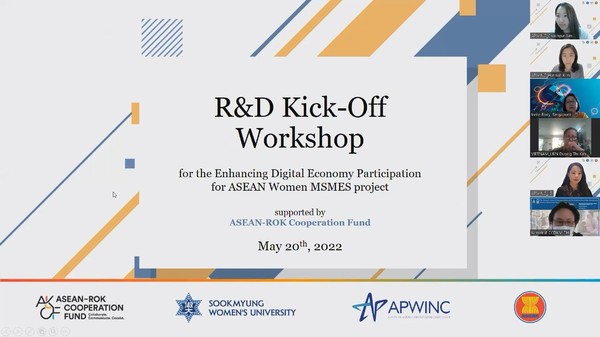
The Asia Pacific Women's Information Network Center(APWINC) is set to hold a "Project Working Committee meeting" online on September 30 of this month. The APWINC is an institution attached to SMWU that contributes to the development of women's information culture and digital economic capabilities. This organization has been a host institution for the UNESCO Chair in communication technology for women from 1998 until now. To reduce the digital and technological divide for women, the institution held an R&D Kick-off meeting for the "Enhancing Digital Economy Participation for ASEAN Women Micro-, Small-, and Medium-sized Enterprises" project on May 20. At the conference, ASEAN Coordination Committee Micro-, Small-, and Medium-sized Enterprises, the R&D team, the ASEAN-ROK Cooperation Fund, and the APWINC gathered and discussed the project which will work to develop curriculum and content to revitalize e-business. "The e-business training toolkit" based on research by the R&D team, due to be released in October, will be used to educate 200 local instructors from 10 ASEAN countries. The instructors aim to return to their countries and help local women to strengthen their digital capabilities and boost women's participation in the digital economy by completing the curriculum which will be held in Korea in 2023. This project and its instructors will help women entrepreneurs who are likely to be held back by the barriers of digital information more effectively engage in digital economic activities for their business. Therefore, the center is planning to provide mentoring about online business and hold an expo to discuss business performance. Professor Cho Jungin, the head of the APWINC, explained the seriousness of the education gap for women, saying, "Korea ranks in last place on the glass ceiling index among developed countries, and many women in Asia, including Korea, are suffering from digital information gaps. The reason why efforts are needed to reduce the gap for women is that many women still do not have an opportunity to learn, and even if they are educated, they often have to choose between their jobs and families." In other words, she emphasized the necessity of education for women by illustrating the reality that it is still hard for women to get ahead.
The "Project Working Committee meeting" focuses on finding local partners who can cooperate with the institution on a five-year project. In addition to the R&D team launched on May, 14 additional local institutions from 10 countries will be selected to participate. Also, a steering committee will be held with consultants and additional local institutions, led by the Asia Pacific Women's Information Network Center. Through the committee, the center is expected to establish a close partnership and share ideas for ways to increase women's participation in digital economic activities over the next four years. After the meeting, the local institutions in each country plan to recruit female candidates and instructors to participate in local training. Through the program, about 200 instructors and 4,000 preliminary micro and small enterprise female business owners from 10 countries will be trained to bridge the digital information gap and improve participation in the digital economy for women. The Asia Pacific Women's Information Network Center is carrying out not only these cooperative projects but also other activities related to UNESCO Chair. A case in point is the "University Twinning and Networking Program", sponsored by the Ministry of Education and UNESCO. The program is an international development cooperation project that focuses on "strengthening women's capabilities through ICT and leadership education." The program aims to empower global higher education institutions through knowledge or research exchange activities by establishing a network between global high school institutions. Professor Cho said, "I hope Sookmyungians strive to bridge the educational gap and strengthen access to information for women while promoting the world's best digital humanities university." The programs being held by the center are helping to establish a sustainable cooperation system in terms of information exchange and research cooperation for development between SMWU and ASEAN. Therefore, it seems that the institution will actively provide Sookmyungians with opportunities to enhance their global capabilities by working on cooperative projects between Sookmyung and ASEAN.
Kang Kim Hyojung / Reporter
smt_kkhj@sookmyung.ac.kr
Lee Gayun / Reporter
smt_lgy@sookmyung.ac.kr


